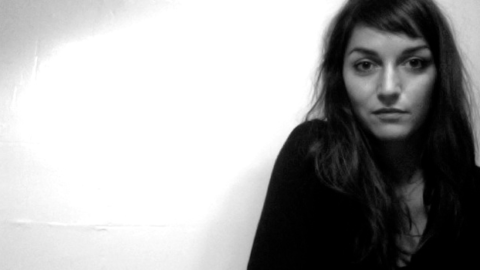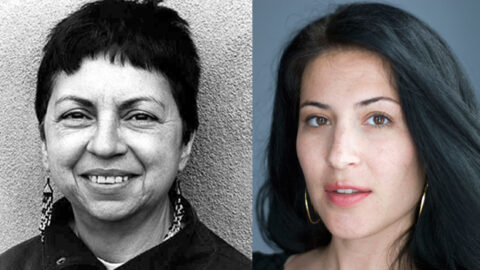“Saraswati Takes Back the Alphabet”: An Interview with Shilpa Kamat
I was driven by the forces that create and break language: sound, migration, immigration, alienation, speech, accent, imperialism, place, longing, myth, consciousness, archetype, universality, magic.” – Shilpa Kamat, “Saraswati Takes Back the Alphabet”
Poet, visual artist, and educator Shilpa Kamat contends with the violent legacies of imperialism, her lived experience, language, and threats of erasure in her chapbook, “Saraswati Takes Back the Alphabet,” finalist for the 2018 Anzaldúa Poetry Prize. In “eleven,” mid-way through the chapbook, Kamat writes, “the demons were never/ evil just regular/ people who prayed.”
The content of Kamat’s life—the experience of thinking across multiple languages, and being rooted in a particular lineage, Konkani, while having grown up elsewhere—is woven into the chapbook. She is concerned with nuance and layers, integrating her fascinations with magic and the sociopolitical without oversimplifying the past. Kamat is committed to exploring where magic still resides despite every violent attempt to erase it.
“French Braid”: An Interview with Rennie Ament
Part instruction manual for living, part mourning song and meditation on America, Rennie Ament’s aptly titled chapbook, “French Braid,” weaves stories of being both at home and not at home in the world. The 2018 Anzaldúa Poetry Prize finalist braids lived experiences with the absurd, painting strikingly vivid, arresting scenes that rouse readers’ emotions and intellect. As she writes, “you have to be the explosion you wish to see,” and her poetry is precisely that: an explosion that we all need to see.
Rennie Ament’s work has appeared in Colorado Review, Sixth Finch, Redivider, Yalobusha Review, minnesota review, The Journal, DIAGRAM, and elsewhere. She is the winner of the 2018 Yellowwood Prize in Poetry from Yalobusha Review and a nominee for both the Pushcart Prize and Best New Poets. She’s also received fellowships from the Millay Colony, the Saltonstall Foundation, the New York State Summer Writers Institute and the Vermont Studio Center. She lives in New York City.
Jamie Wagman: I would love to hear a bit about your writing life and your process. What’s influenced your writing? When did you first know you were a writer, and what has your journey as a writer been like? What delights and what scares you most as a writer?
Rennie Ament: Poem-wise, I don’t pay attention to semantics at first. I’ll give myself some kind of formal constraint (a sonnet, “e” the only vowel allowed, words can only come from a specific source text), but mostly I want to play in language and surprise myself. It’s fun to scribble gibberish until something sounds both strange and true.
Anemochore: An Interview with Meredith Stricker
Meredith Stricker’s Anzaldúa Poetry Prize winning chapbook “Anemochore” is truly beautiful and inspiring. From her unique and layered title “Anemochore,” to her intricate design and use of space on each page, Stricker offers as much insight and perspective from their placement of her words as from their meaning.
“Anemochore” keeps no borders between visual art, poetry and even music. Stricker’s work here demonstrates a melding of ideas that flow naturally from page to page, evoking all of a reader’s senses.
Meredith Stricker fuses her work with her own experiences, including performances with musicians, her own work as an architect in Big Sur, California and her deep perspective into the value of poetry and imagery. The second part of the chapbook, The Be/s of the Invisible, was a collaboration with several other musicians that link the life of bees to the freedom in poetry.
Her chapbook “Anemochore” will be published by Newfound in spring of 2018.
Steve Mulero: When did you begin writing poetry and what were some of your influences on your early journey into poetry and art?
Meredith Stricker: Because my mother was a war refugee for whom English was a second language and my father’s family from Russia spoke in an archaic form of German, I grew up
in a household where several languages mingled in ways that were basically incomprehensible to me, except as a kind of music or rhythm that was deeply familiar, but also untranslatable.
‘Simbelmynë’ – An Interview with Anna King
Anna King is a PhD student at Georgia State University, 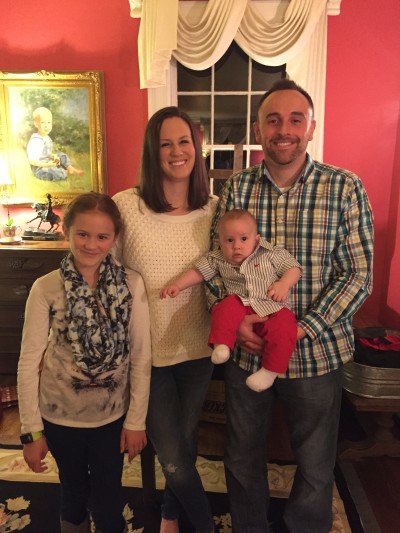 a mother of two, and a small-business owner (she runs a soy candle business with her husband Chad). Her other passions include fitness, preferably Cross-fit at her local gym in McDonough, Georgia. King’s works have been published in literary magazines as well as academically in the “Ellen Glasgow Journal of Southern Women Writers.” King was offered a fellowship by the Summer Literary Seminars and she has been nominated for a Pushcart. King’s chapbook “Simbelmynë” is a finalist for the 2015 Anzaldúa Poetry Prize.
a mother of two, and a small-business owner (she runs a soy candle business with her husband Chad). Her other passions include fitness, preferably Cross-fit at her local gym in McDonough, Georgia. King’s works have been published in literary magazines as well as academically in the “Ellen Glasgow Journal of Southern Women Writers.” King was offered a fellowship by the Summer Literary Seminars and she has been nominated for a Pushcart. King’s chapbook “Simbelmynë” is a finalist for the 2015 Anzaldúa Poetry Prize.
‘West Illegitimately’ – An Interview with Éireann Lorsung
Éireann Lorsung is a writer, teacher, and editor who received an MFA from the University of Minnesota and a PhD from the University of Nottingham before writing her first book Music for Landing Planes. She recently rec eived a National Endowment for the Arts (NEA) grant in Literature that will allow her to travel and gather research for upcoming projects. Lorsung resides in rural Belgium where she runs a residency center for artists and writers called Dickinson House. She’s also the creative designer of the micro press Miel and editor of Journal 1110.
eived a National Endowment for the Arts (NEA) grant in Literature that will allow her to travel and gather research for upcoming projects. Lorsung resides in rural Belgium where she runs a residency center for artists and writers called Dickinson House. She’s also the creative designer of the micro press Miel and editor of Journal 1110.
‘The First Language’ – An Interview with Amanda Huynh
The notion that fusion and exchange (of culture, of ideas) will result in evolution is central to Amanda Huynh’s poetry. This Texas native nursed a love of writing while earning an undergraduate degree in Biology at the University of Texas at Dallas. Huynh is currently earning an MFA in Creative Writing at Old Dominion University, where
‘What Cement is Made of’- An Interview with Daniel Donaghy
Daniel Donaghy is a writer, professor, father, and husband whose poetry evokes growing up in Philadelphia, the inspiration of his chapbook “What Cement is Made of,” a finalist for this year’s Anzaldúa Poetry Prize.
“empathy for cars / force of July” – An Interview with Poet Davy Knittle
By day, Davy Knittle is a PhD student at the University of Pennsylvania, and by night he’s an award-winning poet. Knittle’s interest in and love of poetry was piqued during high school, when he was taught for a year by poet Yolanda Wisher. While much of Knittle’s life is dedicated to and his writing and his studies, he also enjoys simple things,
Anzaldúa Poetry Prize: 2015 Winner & Finalists
Rodney Gomez: 2014 Anzaldúa Poetry Prize Winner
Heather Kirn Lanier: A Poet Obsessed
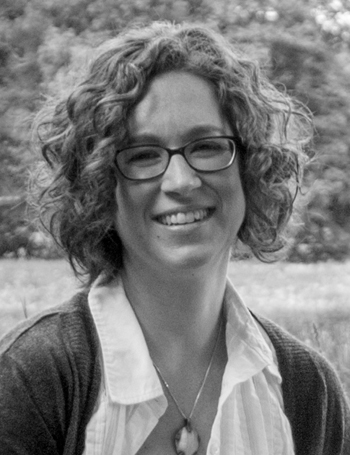 Heather Kirn Lanier’s poetry chapbook, Heart-Shaped Bed in Hiroshima, a finalist for the 2014 Gloria E. Anzaldúa Poetry Prize, reflects an obsession. But it should not surprise us that most of her work does this. Like many writers, she finds she must follow her obsessions wherever they lead.
Heather Kirn Lanier’s poetry chapbook, Heart-Shaped Bed in Hiroshima, a finalist for the 2014 Gloria E. Anzaldúa Poetry Prize, reflects an obsession. But it should not surprise us that most of her work does this. Like many writers, she finds she must follow her obsessions wherever they lead.
“The collection is about trying to understand the brutalities of war through mediated forms—memorials, museums, news headlines, biographers. It’s about trying to bridge the chasm between the citizen and the far-away war her country is waging. It’s about feeling responsible to bridge that gap, even while it’s ultimately impossible,” says Lanier.
Olivia Cronk: Junk Drawer Poet and Mood Thief
Olivia Cronk is one of two finalists for Newfound’s 2014 Gloria E. Anzaldúa Poetry Prize. Her sublime imagery, irreverence and precision of language struck the panelists and the judge. Coupled with her unique perspective on poetry, she is one to watch, if not to get to know. Look for her poetry in our print issue.
REGGIE CARLISE: Tell me about yourself.
OLIVIA CRONK: I live on the north side of Chicago, where I also teach writing at a small commuter university, Northeastern Illinois University. I teach both Introductory Compositio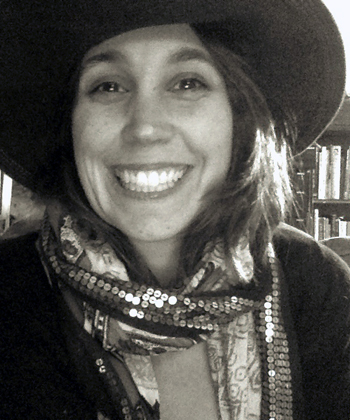 n and upper level Poetry Writing courses, so my artistic and professional selves are at once in competition with one another and deeply entangled.
n and upper level Poetry Writing courses, so my artistic and professional selves are at once in competition with one another and deeply entangled.
My first book, Skin Horse (Action Books, 2012), came out of the time of my early teaching life (adjunct work at sometimes three schools at once—this is likely a familiar routine to many Newfound readers) and those poems were an extreme examination of the domestic, often in the flavor of B Horror films, Vincent Price, Giallo, David Lynch, Clara Rockmore. I think those were very, very interior in part because I had such a hectic work life.
And now, my labor situation is a little smoother (or, rather: as smooth as might be expected in the fucked up economy of academic jobs), but I have a small child, and somehow I find myself writing only in long-form (it’s easier to simply “drop in” on a fresh page of an ongoing document)—I only want to work on manuscripts, not on discrete poems. My submission to Newfound’s chapbook contest is from a long poem, “Middle Mansion,” which is about genre, the Fantasy genre, fantasy, (the self inside of the place of) memory, fashion, early adulthood, and apocalyptic settings.











